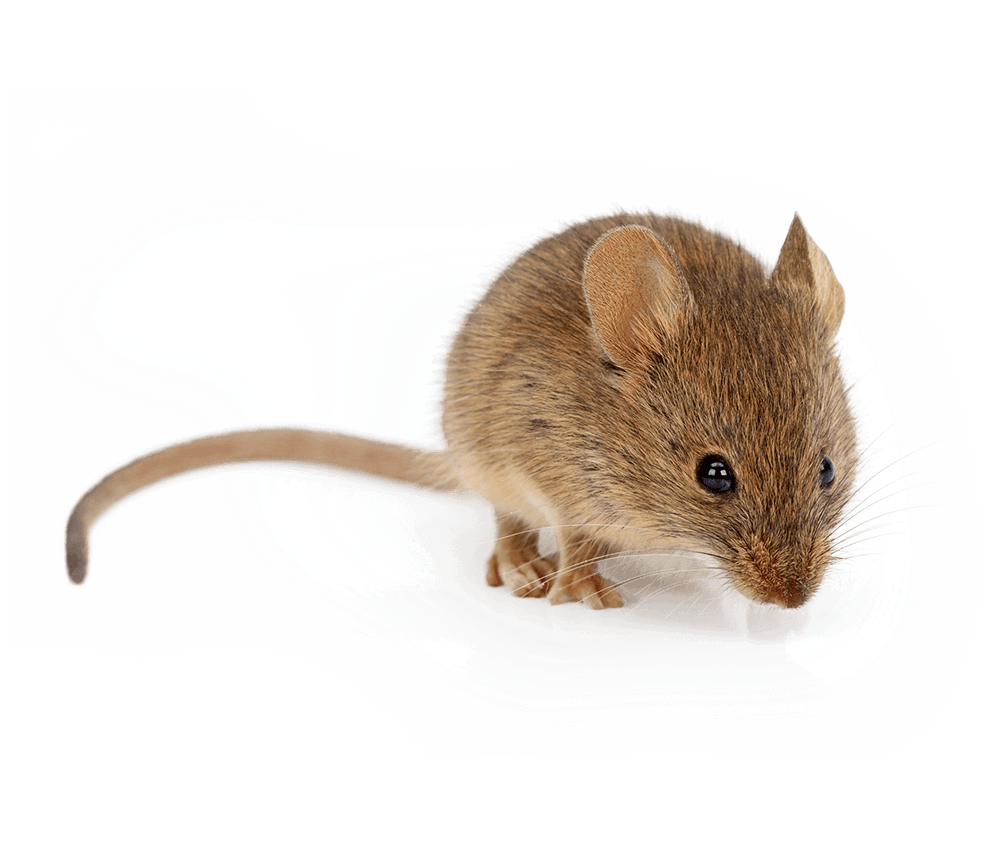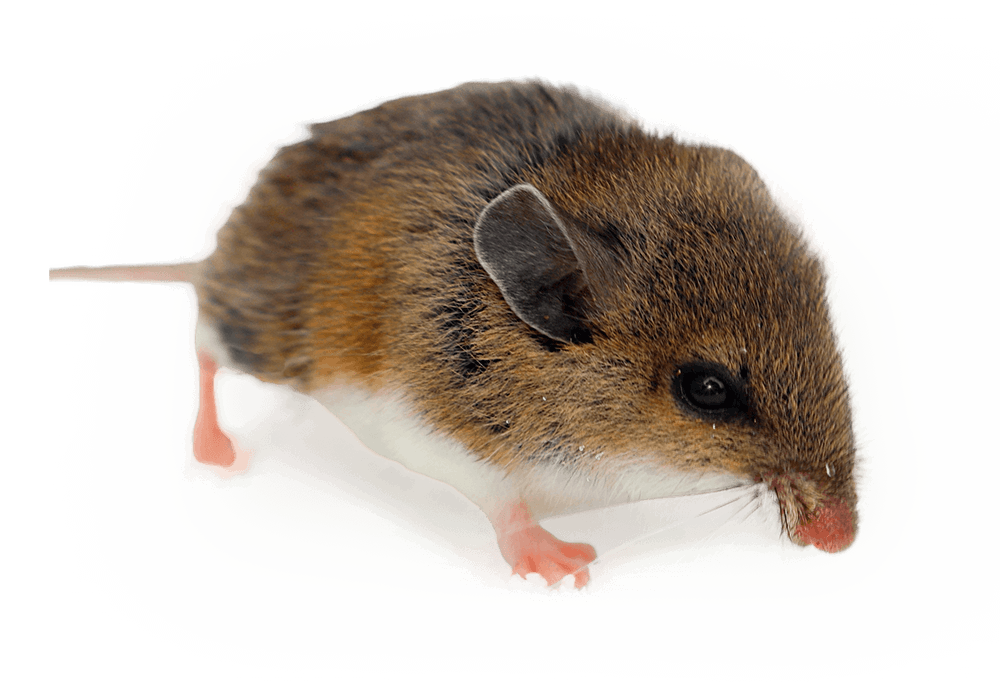Risks and Damage Caused by Mice
Health Risks
Mice can transmit over 55 diseases, including salmonella, and are the primary carriers of Lyme disease. They can also trigger allergies and asthma, particularly in children, according to Johns Hopkins research.
Parasite Hosts
Mice often bring pests like ticks, fleas, and mites into homes, further increasing health risks.
Fire Hazards and Property Damage
Mice cause significant damage by gnawing on wires, insulation, and wood, leading to electrical problems and fire hazards, responsible for 25% of “unknown fires” as estimated by the EPA.
Don’t let small problems turn into big ones.
Schedule Service Now4 Easy Steps to Get Rid of Mice in Your Home and Restore Comfort

1. Call
Our friendly and local customer service team is ready to help.

2. Schedule
Choose a convenient date and time.
3. Our Techs Get to Work
Our highly trained technicians will swiftly and effectively address your mouse infestation.

4. Relax
Sit back and enjoy your pest-free home.
Brody Stats
40
Years in Business5
Offices in Maryland320
Minimum Initial Training Hours Per Technician2200+
Google ReviewsThe Most Common Mice Species in Maryland

House Mouse (a.k.a. “Little Thief”)
- Size: A typical house mouse measures 2.5 to 3.9 inches.
- Why they enter: Mice enter homes looking for food, warmth, and shelter.
- Unique fact: House mice are the most problematic rodents in Maryland, followed by Norway rats. In fact, house mice coexist with people more often than cats or dogs do.
- Infestation size: Approximately 1-60 mice
How to prevent house mice from entering your home:
- Seal cracks and gaps in your home’s foundation and exterior walls.
- Make sure exterior doors and vents have proper weather strips or screening
- Keep your food stored in air-tight containers.
- Regularly clean up crumbs, spills, and clutter and take out the trash.

White-Footed Mouse (a.k.a. "Field Mouse")
- Size: 3.5 to 4 inches in body length. This doesn’t include their tail, which can add an extra 2 to 4 inches.
- Why they enter: They enter looking for food, shelter, and warmth.
- Unique fact: White-footed mice are notorious carriers of Lyme disease, as ticks get the disease from them.
- Infestation size: Approximately 6-8 mice per ½ – 1 ½ acre territory
How to prevent field mice from entering your home:
- Seal all potential entry points in your home.
- Keep your floors crumb-free and secure your trash cans.
- Consistently remove any potential food sources like crumbs, birdseed, or left-out pet food.
Discover Why We’re the Trusted Mouse
Exterminators in Baltimore
Selective Hiring
Rest assured, we have a rigorous hiring process in place to ensure that only the finest rodent control technicians join our team. Your comfort and trust are our utmost priority!
Extensive Training
Our technicians undergo comprehensive training on rodent extermination options. We go above and beyond industry standards to ensure our techs are true experts in family-friendly, eco-friendly, and effective rodent-proofing and pest removal.

Family-Focused, Environmentally-Friendly Pest Control Solutions
Rest easy knowing our rodent control treatments are highly effective in eliminating mice and have also been rigorously tested for environmental impact. Your family’s safety is our top priority.

A Team that Goes the Extra Mile
Our dedicated technicians use the highest-quality products to tackle existing rodent problems, going the extra mile to proactively address common areas and prevent future pests.

Impeccable Reputation
For 40 years, we’ve built a stellar reputation as the best exterminator for mice in Maryland. With 2200+ Google reviews and a 4.9-star rating, our commitment to customer satisfaction is unmatched!
What to Expect with Brody’s Mouse
Extermination Services
Maintain
No need to move anything before we arrive. Our techs will move anything they need to and ensure they’re moved back!
Identify
Each pest is unique. Our techs will inspect and identify which rodents are in your home to ensure we’re using the most effective treatment.
Investigate
We inspect your home for known rodent issue areas, including your yard for potential rodent activity areas.
Treat
Targeted treatments eliminate rodents inside your home and rodent-proofing outside.
Prevent
We take proactive measures with regular seasonal treatments to effectively deter rodents, preventing an infestation from developing on your property and safeguarding your home.
Follow-Up
Our technicians follow up with you 2 weeks after your initial service to confirm if the mice infestation has been eliminated. They will return for follow-up visits until your issue is managed.
Ready to say goodbye to your rodent problems?
Schedule an inspection with us today and let our team of
experienced Maryland mice exterminators take care of the rest.
Frequently Asked Questions about Mice
Identifying Mice in Your Home
Several signs can indicate mice infestations, such as:
- Droppings: Mice leave small, dark droppings wherever they travel but especially in their nesting and feeding areas.
- Gnawed or Damaged Items: Mice have strong teeth and gnaw on various materials to keep them sharp. Look for gnaw marks on food packaging, wires, and even furniture.
- Nesting Materials: Mice build nests using soft materials such as shredded paper, fabric, and insulation.
- Scratching or Scurrying Noises: If you hear scratching or scurrying noises in walls or ceilings, it could be a sign of mice moving around.
Noticing suspicious signs? Our blog Signs There Are Mice in Your Home details the telltale clues of a mouse infestation, from droppings and gnaw marks to unusual noises and unexpected sightings.
If you suspect a mouse infestation in your home, call Brody Brothers! Our team uses family-focused, eco-friendly methods to remove them from your property. Plus, we’ll give you some handy tips to ensure your home stays rodent-free in the long run.
Check out these additional resources if you think you have a mouse infestation:
What You Need To Know If You Have Mice In Your Home for essential information on mouse behavior, risks, and initial steps to take.
What to Do When Mice Infest Your Home for a clear action plan, including professional services, DIY options, and safety tips.
Mouse droppings vary, depending on the species. House mice produce small to medium-sized droppings that are typically dark in color and have a rod-like shape with pointed ends. White-footed mice, a.k.a field mice, produce medium-sized droppings that are lighter in color and have a more cylindrical shape.
If you see any droppings, it’s best to contact a pest control professional for proper identification and treatment.
Still wondering what type of mouse is in your home? Don’t worry! Our blog Are Those Mice or Rat Droppings in My Kitchen? 5 Important Differences Between the Rodents helps you identify the culprit based on additional details and other key signs.
The average mouse infestation size is approximately 6, varying due to factors such as mouse species, how quickly they breed, and available food sources.
Since mice are so small, they can fit through spaces as small as 1/4 inch, including:
- Chimneys
- Utility holes/hookups to the house, especially where hot air and/or smells are coming from (and once they find it, others will follow)
- Gaps around the foundation
- Windows
- Under driveway
- Gaps and holes around utilities, doors, windows, foundation, and vents
- Obscure location gaps with rebar below exterior slabs and gaps around the roof especially with trees and scrubs near the house
- Shared walls between attached homes
Still wondering how those mice snuck in? Our blog How Do Mice Get in Your House? reveals additional entry points and winter-specific considerations to help you tighten up your defenses.
Mice infest homes looking for:
- Food
- Shelter
- Water
Treating Rodent Infestations
Here’s how to get rid of newly introduced mice in your house quickly:
- Set snap traps in strategic locations where they are likely to travel, such as along walls and near food sources.
- Eliminate all potential food sources.
- Seal off all possible entry points with weather stripping, door sweeps, and metal screens.
- Call Brody Brothers for professional mice pest removal.
Considering DIY pest control for mice? Discover why mouse traps alone might not work and explore alternative approaches.
A mouse exterminator will typically use a combination of methods including identifying and sealing off entry points, setting devices, and using bait products to remove mice from your home. They can also provide long-term solutions to prevent mice from returning.
The cost of rodent exterminator services can vary depending on the treatment plan needed for your home and yard. Call Brody Brothers to speak with our experts about your specific needs so we can tailor a plan just for you.
Prevent Mice Infestations
Preventing mice from entering a property is the best way to infestations. Some preventative measures to keep mice out of your house include:
- Seal all potential entry points to your home.
- Store food in sealed containers, especially pet food.
- Regularly clean and sanitize the kitchen and dining areas.
- Seal cracks and holes in the building’s foundation and walls.
- Clean up crumbs and spills regularly.
- Avoid storing items in cardboard.
Here’s how to keep mice out of your yard and maintain a pest-free outdoor space:
- Keep trees and shrubs trimmed away from the building.
- Store firewood away from the building.
- Keep garbage cans tightly closed and away from the building.
- Regularly inspect and maintain outdoor structures such as sheds and garages for cracks or openings that may serve as entry points for mice.
- Remove clutter and debris from the yard that can shelter mice.
- Clean up or remove birdseed feeders
Mice like to hide in dark, secluded places, such as:
- Stoves
- Wall voids
- Under or behind kitchen equipment
- Under cabinets and kickplates
- Ceilings/ceiling voids
- Equipment
- Vents
- Attics
- Garages
- Basements
It’s important to note that since they are most comfortable in corners or hidden and secluded spots, typically where you first spot the rodents isn’t where it actually lives in your home.
Some of the most popular places you’ll find mice in your yard are:
- In debris such as logs piles
- Sheds
- Near exterior trash cans
- In short ground cover, such as ivy
- In yard equipment
- Inside outdoor grills
- Car engines
Problems with Mice
House mice are some of the most difficult pests to control. This is due to several factors, such as:
- They’re rapid breeders: A pair of mice can easily outpace most mouse traps and bait stations.
- They’re nocturnal and secretive: They’re active at night and nest in hidden areas, making them hard to target.
- They have different preferences and behaviors: Some mice readily eat bait products, while others avoid new things, requiring various approaches.
- Their range is small: House mice’ home range is only 4-6 feet, so baits placed outside of their home range are unlikely to be found.
- They’re nibblers: Mice take tiny amounts of food at a time — about the size of a grain of sand — which means the bait needs to be fresh and high-quality bait to be most effective.
- They’re excellent climbers: Mice can crawl up many surfaces, such as vinyl, cement, bricks, wires, vines, counters, and pipes – giving them lots of ways to invade your Baltimore home!
- DIY efforts often backfire: Using the wrong traps, baits, or placement can worsen the problem and create avoidence of control devices
- They require a lot of traps: A small home needs at least 6-8 traps, and larger infestations require significantly more.
Interesting Facts and General Information about Mice:
Mice are omnivores, which means they eat both meat and plants. While they primarily eat seeds and insects in the wild, as the weather cools and they go inside, mice will eat almost anything they can find. This includes:
- Pet food
- Grains
- Bird seed
- Fruits
- Vegetables
- Insects
- Meat
- Soap
- Candy
- Anything you will eat
This varied diet allows them to thrive in many different environments and makes it challenging to control them through food restriction methods alone.
While mice do eat cheese, they tend to prefer carbohydrate-rich foods, such as rice and grains.
House mice do not hibernate, but white-footed mice a.k.a. field mice are known to hibernate.
Mice have relatively short lifespans, averaging 8-12 months. House mice have an average lifespan of 9-12 months, while field mice survivability can be as short as 2 months due to predators.
Mice can be found all year round but Maryland homeowners usually notice them inside from September to January when they seek shelter from dwindling food sources outdoor and cooler temperatures.
Mice stay active through spring and summer as they search for food and nesting materials. Luckily, proper prevention measures keep them at bay no matter the time of year.
Ask Our Trained Mice Extermination Experts
- What Damage Can Mice Cause to My House?
- The Best Way to Get Rid of Rodents
- Expert Tips to Keep Your Home Rodent-Free This Winter
- Are Those Mice or Rat Droppings in My Kitchen? 5 Important Differences Between the Rodents
- How Do Mice Get in Your House? Important Steps to Take in the Winter
- House Mice Vs Deer Mice: How to Know the Difference & Keep Them Away (2025 Expert Guide)
- Common Mice Myths from The Top Mouse Exterminators in Baltimore
- How Do You Know When All the Mice Are Gone?
- Ways to Prevent Mice from Entering Your Home
- 8 Common Mouse Species in the U.S.
- 7 Sneaky Signs of Mice in Your Home
- Health Risks of Having a Rodent Infestation
- Reasons Mousetraps Are No Longer Effective
- Eek! Why Are We So Afraid of Mice that Squeak?
- The Impressive March of the Mouse
- Breaking Down the Biggest Rodent Myths
- What You Need To Know If You Have Mice In Your Home
- Everything You Ever Wanted to Know About Mice but Were Afraid to Ask
- What to Do When Mice Infest Your Home
Your Comfort Is a Call Away
Our customer care team is local and ready to help with professional rodent removal! Call for a FREE quote and schedule your mouse pest control service today.
100% Satisfaction Guaranteed
As a Home Protection Plan customer, if you’re not satisfied with our pest control service, we will service your home at no additional cost until your issue is solved or receive your money back from your last scheduled service.


